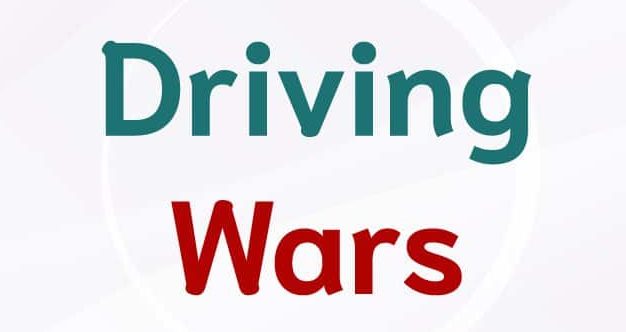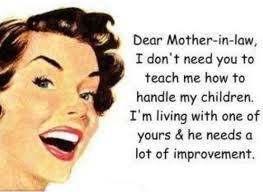Parents Could Be Making Their Kids Worse Behind The Wheel
Parents are there to support their children through the most important life moments whether it is taking the first steps, riding a bicycle or, possibly, driving a car.
However, as many parents know, it can be hard to let your little one go off without you. No matter how old they are – especially when it’s on the wide open road.
Leasing Options has been finding out how parents really feel about their children’s driving and, in particular, how far they’ll go to protect them. It turns out, quite a long way and they are not particularly happy about their children’s driving ability.
- 1 in 10 18-24-year-olds whose parents helped teach them to drive already have points on their license. 90% who weren’t taught by parents have a clean license.
- Nearly 1 in 10 18-24-year-olds who were taught to drive solely by their parents have been banned completely.
- Over 50% of mums and dads use a GPS tracker app to monitor their kid’s driving.
- More than a quarter of parents won’t let their child drive long-distance.
- 3 out of 5 children found their parents act like annoying ‘backseat drivers’.
- 1 in 10 parents finds their kid’s driving distressing.
Over 75% of parents say they’re better at driving than their kids – but they aren’t passing on their wisdom.
When it comes to their children, many parents think they know it all. That’s why it’s no surprise that most mums and dads would agree they’re better at driving than their kids.
Over 75% of parents said they were more skilled behind the wheel.

And when asked what they really thought of their child’s driving, more than 1 in 10 parents described it as ‘worrying,’ ‘risky,’ or outright ‘terrifying.’
Mums and dads don’t just think their kids are dangerous drivers, though. They go on to say their kids have plenty more bad habits, too.
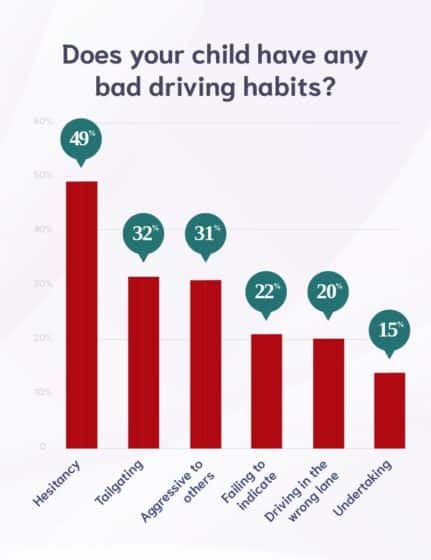
To be fair, most motorists get better with time. Moreso, parents have probably had far more practice in the driver’s seat. But do their years of experience mean anything if they’re actually making their child’s driving worse?
1 in 10 18-24-year-olds taught to drive exclusively by their parents has been banned altogether.
We asked young drivers whose parents helped teach them to drive about how many times they’d been penalized for their bad driving. Our findings suggest that mums and dads are actually driving their children in the wrong direction, with 1 in 10 kids revealing they’d already racked up points on their license.
Since you can only legally pass your test at 17, these young drivers were convicted pretty quickly, which you might think is bad, but it gets worse.
For the 18-24-year-olds who were taught exclusively by their parents to drive, almost 1 in 10 had been banned completely. That means it took these kids merely a maximum of seven years to be disqualified from the roads.
And if it was only their parents who acted as their driving instructor, who’s the one to blame? After all, 90% of children who weren’t taught by their parents had absolutely no points at all.
More than a quarter of parents have forbidden their child from long-distance driving.
To top it off, parents continue to hinder their kid’s driving by stunting their skills, going as far to ban them from long road trips in a strict driving agreement. But this could be holding back new drivers from learning how to navigate or how to handle the motorway alone – essentially restricting their driving development.
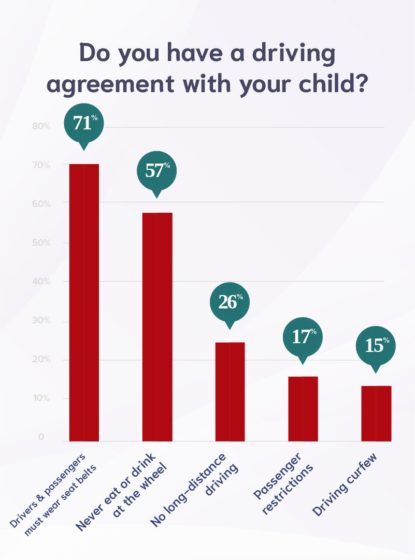
On the other hand, the third of parents that do have a driving agreement with their child is more than likely just being protective.
Over 70% of mums and dads have an understanding with their child that everyone in the car must wear a seat belt, for obvious safety reasons. Plus, more than half of parents discourage their kids from eating and drinking when driving, no doubt, so they always keep both hands on the wheel.
What’s more, 1 in 5 mums and dads limit who gets in their child’s cars, as passengers can distract new drivers and persuade them to take risks, according to The Highway Code.
Some parents would even go so far as to shield their child from driving altogether. It seems mums and dads don’t want their kids to gain their independence too quickly, with more than a quarter saying they’d want to increase the legal driving age.
And while you might think driving would give young people some freedom after all, in this day and age, parents can triumph with technology.
50% of protective parents use a GPS tracker to keep an eye on their kid’s driving.
Mums and dads continue to try and keep their kids safe by using apps to track their driving. We found over 50% use a GPS tracker to check on their child, which is likely for the reassurance their youngster has reached their destination safe and sound.
Additionally, 2 out of 5 parents said they use an app to monitor their child’s speed. This again is probably for mums and dads to know their kid will make it home in one piece.
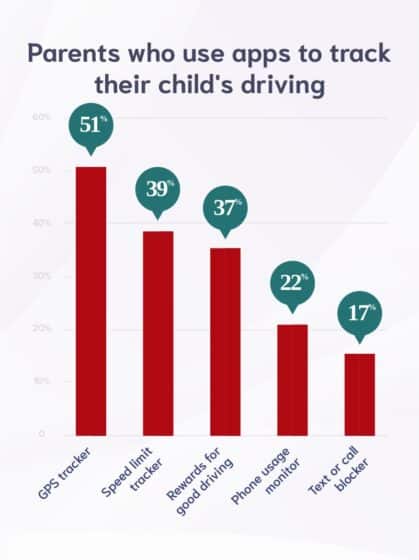
But does all this wrapping in cotton wool help or hinder young drivers? It could be that parents are actually doing more harm than good. At the very least, 18-24-year-olds are furious by their parent’s overprotectiveness.
2 in 5 children find their parents physically recoil when they’re driving.
Almost 60% of children found that their parents are annoying, ‘backseat drivers’. Their mums and dads being critical is the most common complaint.
But more than 2 in 5 of kids also said they find their parents physically flinching or gasping if they make a mistake in the car, which must be incredibly off-putting for the driver.
What seems even more maddening is how nearly a quarter of children catch their parents pressing an imaginary brake pedal on their behalf. This sounds extremely distracting and can’t be a good thing for boosting a new driver’s confidence.
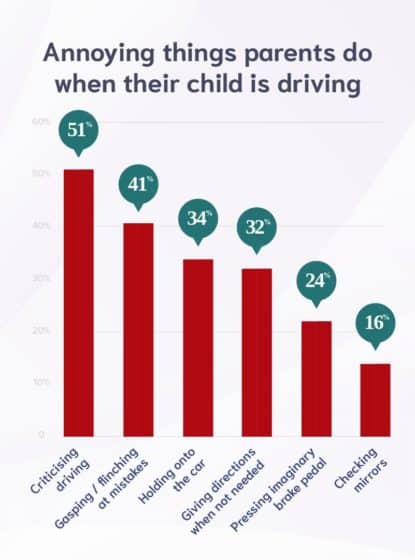
So, which is it? Are young people really the bad drivers their parents make them out to be? Or are overprotective mums and dads simply making the problem worse? They might be just trying to help, but overstepping parents might actually be a hindrance to their kids
We asked the general public to tell us about their experiences driving with either their child or their parents to see if they resembled our findings.
“Most people get professional driving lessons for their seventeenth birthday, but my dad reckoned he could just teach me himself. It wasn’t long before he relaxed and started looking at his phone and I accidentally turned onto the wrong side of the road. Dad was yelling, I was crying, other cars were beeping – it was a nightmare. Luckily, I ended up going with a certified instructor, or I don’t think I would have ever passed my test.”
Michael Kirkby, 28, Galashiels
“I can’t drive myself, so my daughter gets especially livid if I dare to point out any of her mistakes. I don’t even bother to say anything anymore. But she still gets angry if I insinuate her driving isn’t completely perfect. I can’t help flinching when she pulls out without giving way properly. And how can I not cling onto the dashboard when she hurtles around corners at breakneck speed?”
Lesley Dodds, 56, Sunderland
Finally, it’s up to you as a parent to build your child confidence while driving. It’s also logical to want your teenager to be aware of the many dangers of the road. With this in mind, here are four of the most important things to teach your teenager about driving.

